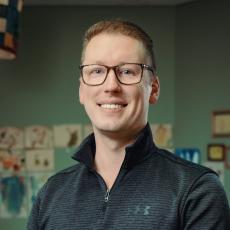According to elementary music teacher P. Eric Bottorff, everything in education is based upon strong relationships. Having started his career as an educator in 2010, Eric has over a decade of teaching experience and a few philosophies he’s built along the way.
Currently, he is enrolled at the University of Michigan-Dearborn, where he is earning a doctoral degree in educational leadership and administration. With his previous experience as an educator, Eric has been able to bring some of his teaching philosophies to his doctoral cohort.
“We edit each other's work, share resources, make connections, and celebrate each other's success,” he says. “Education is community.”
In addition to his role as a student and educator, Eric has created a volunteer program within his community, guided future educators in arts education as a university lecturer, and explored systems of support within a high school advisory program. In January 2024, Eric received the Michigan Music Teacher of the Year Award from the Michigan Music Education Association. The award was presented in recognition from his colleagues for the valuable work he does in the classroom.
“My work is about making sure every student has a person whose eyes light up when they walk in the room. It is about making sure students are excited to show up, sad to leave and learn something in the middle,” he says.
Creating a volunteer program
Creating a bridge between schools and their communities has been one of his primary focuses. During his principal internship, Eric says he noticed that the adults in his school building were not entirely representative of the students. In response to the lack of diversity, he went to the PTA to start a program that would allow for more diverse representation of adults in the classroom.
“There was a group of male caregivers who wanted the opportunity to volunteer in the school. As the only male presenting teacher in my school, I felt a responsibility to help,” he says. “This is my goal and my role, to create opportunities for others to benefit and to open the door for others to walk through.”
The program he started was called Watch D.O.G.S. — a national organization created to build community by bringing male presenting caregivers into the school building. Over the past year, the program has ushered in 63 additional volunteers who are able to work with as many as 100 students a day. This program has acted as a tool to build the school's relationship to the community, and has been met with an overwhelmingly positive response from the students. Not only has the program helped propel this vital relationship but it’s resulted in an increased understanding and respect from the volunteers for the work provided by the faculty and staff.
“Most importantly the students have built relationships with a more diverse and representative group of adults who are helping them learn to navigate their place in the world,” he says. “Establishing this program did not help one single person. It created an opportunity for hundreds of people.”
Future Administrator
Whether it’s seeing the smiles on students as they get off the bus each morning, or the excitement and enthusiasm for another day of learning in the classroom, both of these experiences are what Eric would call some of his proudest achievements. Separating from parents and coming into the care of another adult can be a hard transition for a lot of young students, but by greeting his students at the doors with love and care, he makes it a point to let his students know that they are in a welcoming space.
As he continues his role as a teacher, Eric is also working towards becoming a building-level administrator in a public school. He says his goal is to create an environment that builds strong relationships that will benefit the social, emotional, and academic growth of the students.
“Creating classrooms where students are excited to show up can't come from one exceptional educator. It comes from a group of educators who feel capable and empowered to build caring connections with students,” he says.
Teaching future educators
In addition to his incredible work teaching younger students, he also teaches college-level courses on Dearborn’s campus. “In my role as a lecturer in education, I teach a class that prepares future elementary teachers to use visual and performing arts,” he says.
He goes on to say that many students are made to believe that they are not artists or that not everybody can sing. In his work as a lecturer, he tries to combat these preconceived notions of what it means to be an artist, encouraging his students to create freely and without judgment.
“I want every student to leave knowing they are capable. We practice replacing the phrase ‘I can't sing/draw/act/etc.’ with ‘I haven't practiced that much.’ Every student should leave believing they are capable and have the tools to succeed — both children and adult students,” he says. “My teaching is led by the belief that ‘If I teach you, and you try, but you fail, then it is my fault and I need to teach you a different way.’"


